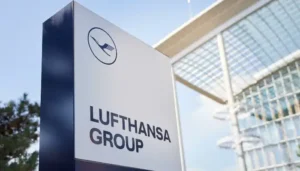German airline group Lufthansa has announced plans to eliminate 4,000 administrative positions by 2030 as part of a broader restructuring strategy aimed at improving operational efficiency and long-term profitability.
The move, disclosed during the company’s Capital Markets Day in Munich, will primarily affect non-operational staff in Germany and is being carried out in consultation with social partners.
The job cuts represent approximately 20% of Lufthansa’s administrative workforce and are part of a larger turnaround programme that includes digital transformation, automation, and integration across its group airlines.
The company emphasized that the restructuring is not expected to impact frontline operational roles such as pilots or cabin crew.
Lufthansa AI and Automation Drive Workforce Changes
Lufthansa’s leadership cited the growing role of artificial intelligence and digital tools in streamlining operations as a key factor behind the decision.
The company is reviewing internal processes to identify overlapping tasks and functions that may no longer be necessary due to technological advancements.
“The profound changes brought about by digitalization and the increased use of artificial intelligence will lead to greater efficiency in many areas and processes,” the company stated.
This includes re-evaluating administrative functions across Lufthansa’s network, which includes SWISS, Austrian Airlines, Brussels Airlines, and ITA Airways.
Executives also noted that managing costs is easier at bases outside Germany, such as Rome, where ITA Airways operates.
This geographic flexibility is expected to support the group’s broader cost-control efforts.
Financial Targets and Investor Confidence
Lufthansa has included the restructuring in its renewed financial strategy, aiming to achieve an adjusted operating margin of 8–10% by 2028—an increase from its earlier target of 8%.
The group also plans to generate over €2.5 billion ($2.9 billion) in free cash flow annually.
The announcement appears to have reassured investors, with Lufthansa’s shares rising by 2% in early trading following the news.
The company had previously issued two profit warnings in 2024 due to cost pressures, labour disputes, and slower-than-expected aircraft deliveries.
Lufthansa Fleet Expansion and Operational Integration
Despite the job cuts, Lufthansa is preparing for its largest-ever fleet expansion.
The group plans to add more than 230 new aircraft by 2030, signaling confidence in long-term demand for air travel.
This expansion will be accompanied by deeper integration among its airlines to improve returns and reallocate resources from high-cost divisions to more profitable subsidiaries.
The company designed these changes to position Lufthansa for sustainable growth and to enhance cooperation across its various business units.
The goal is to create a more agile and responsive organizational structure that can adapt to market shifts and technological disruption.
Employee Impact and Industry Context
While the company has committed to working with social partners to manage the transition, the scale of the layoffs has raised concerns among employee groups.
Lufthansa plans to phase out the affected roles gradually over the next five years, allowing some room for internal redeployment and retraining.
Lufthansa’s move mirrors similar restructuring efforts by other global firms embracing AI and automation. Companies like Salesforce, Accenture, and Klarna have also announced workforce reductions linked to digital transformation strategies.
As the aviation industry continues to recover from pandemic-era disruptions, Lufthansa’s restructuring underscores the balancing act between cost control and growth.
Observers will closely watch how the company manages this transition while maintaining service quality and employee morale.
Note: We are also on WhatsApp, LinkedIn, and YouTube to get the latest news updates. Subscribe to our Channels. WhatsApp– Click Here, YouTube – Click Here, and LinkedIn– Click Here.



